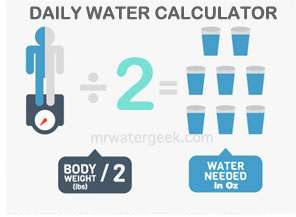CRAZY Water Facts I Bet You Don’t Know (Infographic)
Disclaimer: The information contained in the complete drink more water guide infographics below are based on the needs of the average healthy adult.
It is intended as a guide based on current scientific and academic data – not specific medical advice.
Always seek professional medical advice before making any drastic changes to your water intake. Remember that it can be as dangerous to drink too little water as it is to drink too much water.
Want to use this infographic on your blog? Just copy and paste the code below!
Drink More Water Infographic Breakdown
Why Is Water So Important?
 Apart from the air you breathe, water is one of the most single important resources that keeps you alive. Consider the fact that you can go around 1 month without food but only a week without water!
Apart from the air you breathe, water is one of the most single important resources that keeps you alive. Consider the fact that you can go around 1 month without food but only a week without water!
Your body is around 55-65% water and most of the organs in your body are made up of water:
- Lungs 83% water
- Brain 75% water
- Skin 64% water
- Blood 90% water
- Bones 31% water
- Kidney 79% water
- Muscle 79% water
- Liver 79% water
All the vital organs in your body need regular and consistent water not just to function properly but actively avoid future health problems.
For instance, you can expect to protect vital organs like your heart if you simply drink more water.
Don’t believe me?
Consider a 6-year study published in the American Journal of Epidemiology. The study shows how people who drink over 5 glasses a day are 41% less likely to suffer and die from a heart attack. This is when compared to people who drank less than 2 glasses of water during the same period.
Simple Signs of Dehydration.
Did you know that around 75% of Americans are chronically dehydrated according to doctors? Learning about this shocking fact is one of the big motivators for me creating this blog.
The scary thing is most people underestimate the horrific health effects of constant chronic dehydration. For instance, persistent dehydration can lead to things like sunken eyes, low blood pressure, rapid heart beats and in extreme cases, death.
The sad fact is that most people are dehydrated and don’t even know it.
So here are some simple signs that will help you quickly spot dehydration:
1. Dry Mouth
The ideal situation is for your mouth to be moist. This is when it functions at its optimal state and performs well. A dry mouth can indicate dehydration because there is not enough fluids in your body to replace saliva.
2. Fatigue (Tiredness)
When your body doesn’t have enough water it has to work harder to properly function. Your body working over time in this way makes you feel more tired.
3. Dizziness
One of the organs in your body that needs water the most is your brain. Feeling dizzy could be a sign that your brain lacks enough fluids to do its job.
4. Dark Urine
If your urine is a dark yellow or orange, then it’s a possible sign that you’re dehydrated. If dehydration is the cause of dark urine, then your urine is that way because it is more concentrated. While pale light yellow urine can be a good indicator of enough water passing through your system.
5. Headaches
Many people suffer from headaches and migraines not realising the cause is a lack of water. I recently discovered a study in the journal of Neurology where scientists tested 2 groups of migraine sufferers. The first group were asked to drink an extra 1.5 liters of water (approximately 6 cups) each day and the second took a placebo. After doing this for two weeks, the water drinking group experienced 21 fewer hours of headache pain than the placebo participants. The participants who drank water also talked about a decrease in the pain intensity of their migraines (US National Library of Medicine National Institutes of Health).
How Much Water Should I Drink Each Day?
 The old adage was that you should drink 8 glasses a day. But this has no scientific basis.
The old adage was that you should drink 8 glasses a day. But this has no scientific basis.
A physician from Dartmouth Medical School, Dr. Heinz Valtin carried out what has to be the most comprehensive look at the 8-glasses-a-day myth in 2002. In this study, he tried to find the roots and validity of the 8-glass rule.
The results are published in the American Journal of Physiology. The conclusion? There is no scientific evidence to support the 8 glass a day maxim. He later emailed the HuffingtonPost to say that no one has been able to show any scientific evidence to support the “8-glass” recommendation since publishing his report.
So if not 8 glasses them how many?
The correct answer is that you should calculate how much water your body needs based on your weight and with the guidance of a health care expert (Read: How Much Water Should I Drink A Day Calculator).
However, if you need a faster solution then the standard agreed upon by most experts is best summed up by the IoM (Institute of Medicine). IoM is a completely independent, non-profit scientific community that suggests 2.7 litres for adult women and 3.7 litres for adult men. This recommendation specifically applies to adults who are generally healthy and live sedentary lifestyles in moderate temperate climates.
> Read: How Much Water Should I Drink A Day Calculator
When to Drink More Water.
 Apart from using the basic daily water intake calculator, there are some instances when you should drink more water than usual.
Apart from using the basic daily water intake calculator, there are some instances when you should drink more water than usual.
1. Exercise
One of the key functions of drinking water is to regulate your temperature. This is especially critical when your temperature fluctuates during exercise, intense physical activity and sports. Don’t forget that your body loses a lot of water through things like sweat, which will all need replenishing.
 2. Illness
2. Illness
Water is very good at helping you flush out toxins. This is why doctors tell you to get lots of sleep and drink more water when you’re not feeling well.
3. Pregnancy
As a pregnant woman, you may need to drink slightly more water than usual because of the changes in your body and hormones. The extra fluid intake (taken under the guidance of a health care professional) will help your body cope with the new demands of carrying another human being.
4. Climate
As mentioned in one of the previous points, your body needs water to control its temperature. This is why the advice is to always carry a bottle of water with you during the hot summer periods. It is possible to suffer from heatstroke if you fail to drink more water in hot climates.
Drink More Water Infographic (Long Form)
Want to use this infographic on your blog? Just copy and paste the code below!
![]()
Scientific References
American Medical Directors Association. Dehydration and fluid maintenance: Clinical practice guidelines 2001. Biol Res Nurs. 2006;7:197.
Greenhalgh, Alison (March 2001). “Healthy living – Water”. BBC Health. Retrieved 2017-03-19.
Hobbins M. (2003). The SODIS Health Impact Study, Ph.D. Thesis, Swiss Tropical Institute Basel.
Bossingham, M.J., Carnell, N.S., Campbell, W.W. Water balance, hydration status, and fat-free mass hydration in younger and older adults. Am J Clin Nutr. 2005;81:1342–1350.
Lieberman, H.R. Hydration and cognition: A critical review and recommendations for future research. J Am Coll Nutr. 2007;26:555S–561S.
Farrand, S., Campbell, A.J. Safe, simple subcutaneous fluid administration. Br J Hosp Med. 1996;55:690–692.
Galloway SD & Maughan RJ (1997): Effects of ambient temperature on the capacity to perform prolonged cycle exercise in man. Med. Sci. Sports Exerc.29, 1240–1249.
![]()









